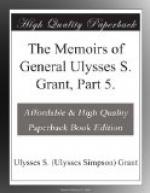I returned down the river to where the troops of the Army of the Potomac now were, communicated to General Meade, in writing, the directions I had given to General Butler and directed him (Meade) to cross Hancock’s corps over under cover of night, and push them forward in the morning to Petersburg; halting them, however, at a designated point until they could hear from Smith. I also informed General Meade that I had ordered rations from Bermuda Hundred for Hancock’s corps, and desired him to issue them speedily, and to lose no more time than was absolutely necessary. The rations did not reach him, however, and Hancock, while he got all his corps over during the night, remained until half-past ten in the hope of receiving them. He then moved without them, and on the road received a note from General W. F. Smith, asking him to come on. This seems to be the first information that General Hancock had received of the fact that he was to go to Petersburg, or that anything particular was expected of him. Otherwise he would have been there by four o’clock in the afternoon.
Smith arrived in front of the enemy’s lines early in the forenoon of the 15th, and spent the day until after seven o’clock in the evening in reconnoitering what appeared to be empty works. The enemy’s line consisted of redans occupying commanding positions, with rifle-pits connecting them. To the east side of Petersburg, from the Appomattox back, there were thirteen of these redans extending a distance of several miles, probably three. If they had been properly manned they could have held out against any force that could have attacked them, at least until reinforcements could have got up from the north of Richmond.
Smith assaulted with the colored troops, and with success. By nine o’clock at night he was in possession of five of these redans and, of course, of the connecting lines of rifle-pits. All of them contained artillery, which fell into our hands. Hancock came up and proposed to take any part assigned to him; and Smith asked him to relieve his men who were in the trenches.
Next morning, the 16th, Hancock himself was in command, and captured another redan. Meade came up in the afternoon and succeeded Hancock, who had to be relieved, temporarily, from the command of his corps on account of the breaking out afresh of the wound he had received at Gettysburg. During the day Meade assaulted and carried one more redan to his right and two to his left. In all this we lost very heavily. The works were not strongly manned, but they all had guns in them which fell into our hands, together with the men who were handling them in the effort to repel these assaults.
Up to this time Beauregard, who had commanded south of Richmond, had received no reinforcements, except Hoke’s division from Drury’s Bluff,(37) which had arrived on the morning of the 16th; though he had urged the authorities very strongly to send them, believing, as he did, that Petersburg would be a valuable prize which we might seek.




